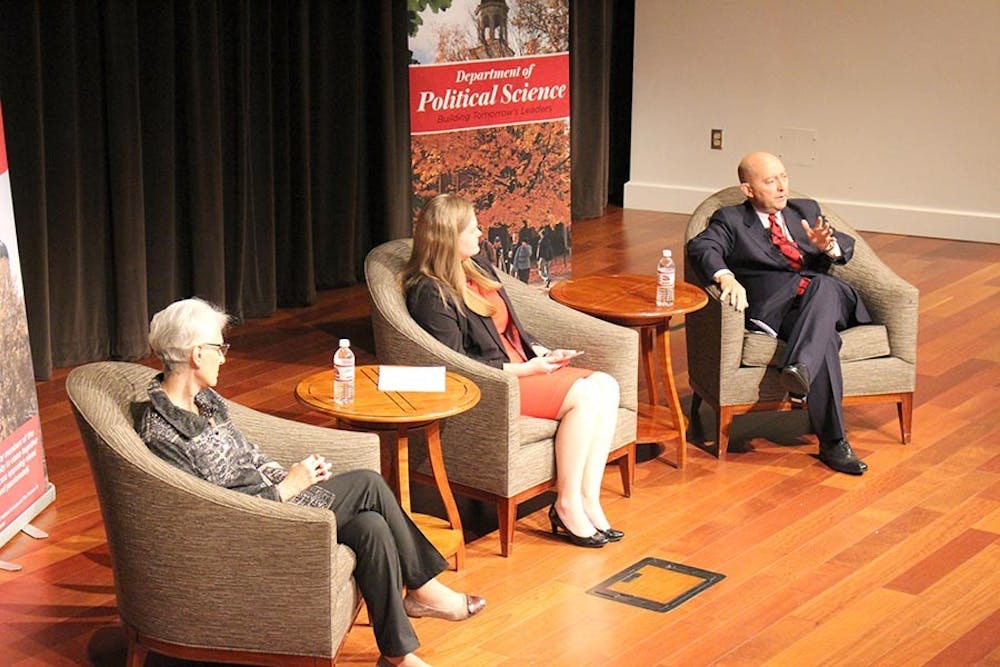By Julia Plant, The Miami Student
Ambassador Wendy Sherman and Adm.l James Stavridis spoke to Miami University students and faculty Wednesday night in the semiannual Janus Forum.
The speakers were given the prompt: "What are the Foreign Policy Challenges Facing the Next US President?"
In response to the prompt, Sherman and Stavridis focused on six issues they believe will be the most important for the president-elect to address in office: the Islamic state, income inequality, relations with Russia, relations with China, relations with North Korea, and the growing presence of cyber in today's world.
Stavridis spoke of the need for hard power when dealing with ISIS, stating that the United States will not negotiate the end of conflict with the Islamic state. Sherman recommended that instead of sending hundreds of thousands of US troops overseas, we should train the citizens of Iran to fight back against terrorism themselves.
Sherman recognized the growing income inequality internationally to be a rising problem. She believes it is the president's job to focus on building the economy here in the US so we have continue to have economic power internationally.
The speakers brought up concerns with both Russia and Putin's desire to recapture the power of the Soviet Union. Both speakers agreed that there will never be a complete agreement between the United States and Russia, so compromise will be necessary.
"We should confront where we must, but cooperate where we can, because neither of us can afford to stumble backwards into the Cold War," said Stavridis.
When it comes to China, Stavridis stressed the need to cooperate, especially when it comes to China's powerful presence over the Philippines in the South China sea.
"The good news is there are places where we can work together," Sherman said, emphasizing diplomacy with China.
The speakers also addressed the urgent problem of North Korea's nuclear weaponry. The country has recently claimed that by 2020 they will have a weapon with the ability to reach the continental United States.
The speakers suggested that convincing North Korea to give up its nuclear weapons might be the only solution.
Enjoy what you're reading?
Signup for our newsletter
"This is an excruciatingly difficult challenge, much harder than the Iran negotiation because North Korea has nuclear weapons," said Sherman, who played a vital role in passing the Iran deal.
Both speakers warned the audience of the growing presence of the cyber world, fearing an attack at the same level as 9/11 over the internet. Sherman reminded the audience that there are no set norms when it comes to the internet, and it will be the next president's job to help get up to speed with the increasingly cyber-dependent world.
Sherman and Stavridis were selected by the students of the Janus forum due to their vast experience in military and diplomatic fields in the US government.
Stavridis led the NATO alliance and global operations as Supreme Allied Commander and served as senior military assistant to the Secretary of the Navy and the Secretary of Defense. After 9/11, he led Deep Blue, a naval think tank for innovation.
Sherman has served as the Undersecretary of State for Political Affairs at the U.S. Department of State. She played a key role in passing the Iran Deal and was awarded the National Security Medal by President Obama.
With the presidential election quickly approaching, the Department of Political Science wanted to continue political discourse among Miami students, said student moderator and Miami senior Kirsten Fowler.
"Since 9/11, we've seen changes in the international arena in how countries interact with each other." Fowler said. "New threats have emerged, so the next president will face some particularly challenging things, and it's interesting to hear an expert's position on those things."
Dr. Patrick Haney, chair of the Department of Political Science, said with this year's strange election, all we have done is degrade the level of political discourse.
"[The Janus Forum] was a real breath of fresh air to raise the level of discussion up, to be serious, to be in depth, and I think they accomplished that goal with flying colors," said Haney.




